

WHICH PROBIOTIC SHOULD YOU TAKE? – Victoria Fenton Healthcare. After all of my articles about #MeToo and how it relates to chronic illness, abuse, trauma, deeply ingrained response patterning etc., you may welcome today’s article which heralds a return to the absolutely practical.
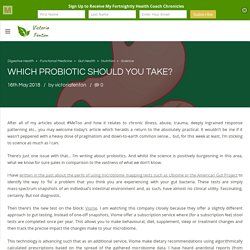
It wouldn’t be me if it wasn’t peppered with a heavy dose of pragmatism and down-to-earth common sense… but, for this week at least, I’m sticking to science as much as I can. There’s just one issue with that… I’m writing about probiotics.
Products and Strains. FermentWorks. Your guide to the difference between fermented foods and probiotics. The Health Benefits of Fermented Foods - The Paleo Mom. Most of us are familiar with at least a handful of fermented foods (like sauerkraut or yogurt); but the history, variety, and benefits of fermentation are much more extensive than many people realize.
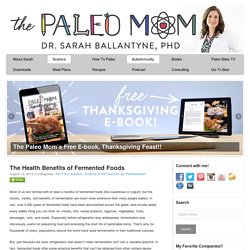
In fact, over 5,000 types of fermented foods have been documented across the globe, and include nearly every edible thing you can think of—meats, fish, cereal products, legumes, vegetables, fruits, beverages, nuts, and seeds. Especially before refrigeration was widespread, fermentation was ridiculously useful for preserving food and extending the shelf life of perishable items. That’s why for thousands of years, populations around the world have used fermentation in their traditional cuisines. But, just because we have refrigerators now doesn’t mean fermentation isn’t still a valuable practice! In fact, fermented foods offer some amazing benefits that can’t be obtained from other nutrient-dense foods.
Probiotics Infographics.
How to Take Probiotics. Video: Probiotics - A quick trip inside our guts! What the Latest Research Says about Probiotics, with Lucy Mailing. Are Probiotics Useless? A Microbiome Researcher’s Perspective. Do Probiotics Really Work? “Dr.
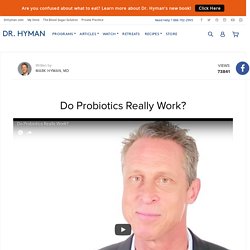
Why Probiotics Don’t Always Work. Probiotics: Benefits Beyond Gut Health. All About Probiotics with Professor Gregor Reid. Science-Based Probiotic and Prebiotic Information. By Dr.
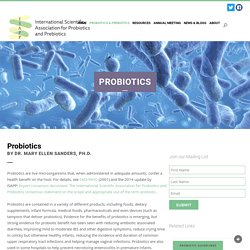
Mary Ellen Sanders, Ph.D. Probiotics are live microorganisms that, when administered in adequate amounts, confer a health benefit on the host. For details, see FAO/WHO (2001) and the 2014 update by ISAPP: Expert consensus document: The International Scientific Association for Probiotics and Prebiotics consensus statement on the scope and appropriate use of the term probiotic. Certain probiotic health benefits may be associated with higher taxonomic groups rather than strain. Mechanism of probiotic action in healthy individuals still unsettled - Gut Microbiota for Health. A recent systematic review in Genome Medicine, authored by Nadja B.
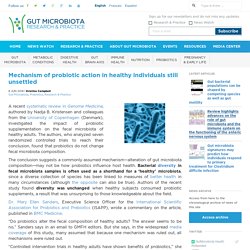
Kristensen and colleagues from the University of Copenhagen (Denmark), investigated the impact of probiotic supplementation on the fecal microbiota of healthy adults. The authors, who analyzed seven randomized controlled trials to reach their conclusion, found that probiotics do not change fecal microbiota composition. Do Probiotic Supplements Stick Around In the Gut? – Lacto Bacto. How a Popular Probiotic Works. Eating a type of bacterium encourages the activity of other gut microbes, according to a small study.
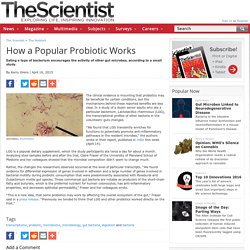
“We found that LGG transiently enriches for functions to potentially promote anti-inflammatory pathways in the resident microbes,” the authors wrote in their report, published in mBio this week (April 14). LGG is a popular dietary supplement, which the study participants ate twice a day for about a month. Analyzing stool samples before and after the trial, Claire Fraser of the University of Maryland School of Medicine and her colleagues showed that the microbial composition didn’t seem to change much.
Rather, the changes the researchers observed occurred at the level of particular transcripts. Are Probiotics The New Antioxidants. What happens to ingested microbes? Bacteria in food, including probiotics, are a major environmental source of microbes in the human body.
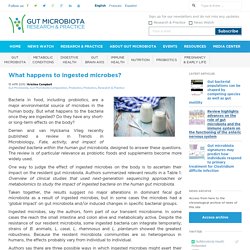
But what happens to the bacteria once they are ingested? Do they have any short- or long-term effects on the body? Derrien and van Hylckama Vlieg recently published a review in Trends in Microbiology, Fate, activity, and impact of ingested bacteria within the human gut microbiota, designed to answer these questions. The review is of particular relevance as probiotic foods and supplements become more widely used. One way to judge the effect of ingested microbes on the body is to ascertain their impact on the resident gut microbiota. Everything You Wanted To Know About Probiotics .pdf. How are probiotics delivered most effectively? - Gut Microbiota for Health.
Probiotics (mainly Lactobacillus and Bifidobacterium) are often consumed in dairy products, such as yogurts and fermented dairy drinks.
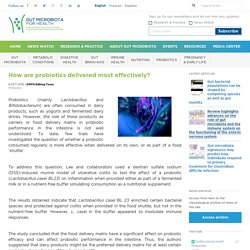
However, the role of these products as carriers or food delivery matrix in probiotic performance in the intestine is not well understood. Probiotics: Mercola Complete Probiotics. A healthy individual response to probiotics is different than a person with CFS etc.
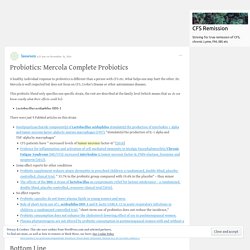
What helps one may hurt the other. Dr. Mercola is well respected but does not focus on CFS, Crohn’s Disease or other autoimmune diseases. This probiotic blend only specifies one specific strain, the rest are described at the family level (which means that we do not know exactly what their effects could be). Lactobacillus acidophilus DDS-1. Prebiotics, Synbiotics & How to Feed Your Gut Bugs. Learning what happens between a probiotic input and a health output - Gut Microbiota for Health. Input and output are subjects of intense interest in the scientific study of probiotics.
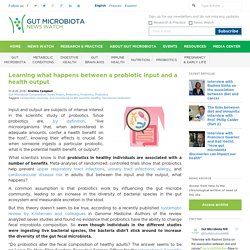
Since probiotics are, by definition, “live microorganisms that, when administered in adequate amounts, confer a health benefit on the host”, knowing their effects is crucial. So when someone ingests a particular probiotic, what is the potential health benefit, or output? A common assumption is that probiotics work by influencing the gut microbe community, leading to an increase in the diversity of bacterial species in the gut ecosystem and measurable excretion in the stool.
But this theory doesn’t seem to be true, according to a recently published systematic review by Kristensen and colleagues in Genome Medicine. Authors of the review analyzed seven studies and found no evidence that probiotics have the ability to change fecal microbiota composition. Probiotic does not restore gut microbiota function in patients with metabolic syndrome — The American Microbiome Institute.
Metabolic syndrome is a condition that often leads to diabetes, heart disease, and even stroke and obesity, a chronic worldwide epidemic is a leading cause of metabolic syndrome (MetS). Probiotics and natural herbs may assist in preventing liver disease — The American Microbiome Institute. Last May we talked about a study that described gut dysbiosis as an underlying cause to the development of steatosis and liver failure.
In brief, the researchers theorized that opportunistic gram negative bacteria can populate the gut as a result of gut dysbiosis. These bacteria can release lipopolysaccharides into the blood stream, and upon reaching the liver, induce inflammatory toxic damage leading to steatosis. Changes in the Functional Potential of the Gut Microbiome Following Probiotic Supplementation during Helicobacter Pylori Treatment. Fructose And Probiotics.